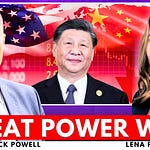The BRICS+ alliance, under the chairmanship of Brazil, held a conference, "The Dilemmas of Humanity," in São Paulo, where the bloc’s members and partners discussed approaches to countering the tariff regime imposed by the Trump administration, a new financial architecture, and enhancing platforms to promote South-South cooperation.
Yaroslav Lissovolik attended the conference and shared recent updates with us. In our conversation, Yaroslav emphasized that President Trump’s tariffs are encouraging countries of the Global South to increase cooperation and establish joint commodity platforms, such as the BRICS+ Grains Exchange. With more than 30 countries expressing interest in joining the bloc, its expansion is an indicator of the global shift in power fueled by the economic and trade policies of the West.
To address the flaws in global economic governance, the BRICS+ advocates for establishing a regional governance layer between national economies and global institutions like the IMF and World Bank. This intermediate layer would include regional trade, financing, and development institutions, which already possess more combined resources than their global counterparts. While some progress has been made, a comprehensive system is still lacking. The Global South, with existing regional groups and financial institutions, is well-positioned to lead this initiative through integration and coordination.
Dr. Yaroslav Lisovolik is the founder of BRICS+ analytics, a valuable source of unbiased and professionally presented, highly detailed information on the BRICS+ economic alliance and its latest developments.
Thank you to all my subscribers for being part of World Affairs in Context. Your support makes the newsletter happen, and your questions, ideas, and suggestions inspire it. Please consider becoming a paid subscriber, which will help contribute to the resources needed to produce more content on the platform. If you’d like to make a one-time contribution, please do so via PayPal or Buy Me a Coffee.











